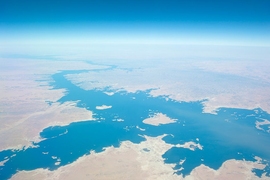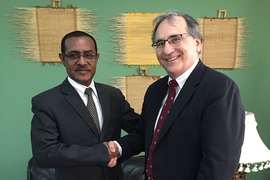An international workshop at MIT proposed a new path toward resolving the seemingly intractable conflict over allocation of the Nile waters. In two days characterized by frankness, representatives from Egypt, Ethiopia, and Sudan acknowledged that a forward-looking resolution requires releasing the baggage of history and distrust.
“We reframed the problem,” says Elfatih A. B. Eltahir, the Breene M. Kerr Professor of Hydrology and Climate and Professor of Civil and Environmental Engineering (CEE) at MIT. Eltahir steered the direction of the meeting away from discussions of the Grand Ethiopian Renaissance Dam (GERD), the controversial hydroelectric dam being built in Ethiopia. When completed, it will be the largest dam in Africa and will hold about 70 cubic kilometers of water. The project has stirred fears of restricted flow to downstream Nile countries.
“That’s a symptom of a conflict but it’s not the heart of the conflict. So we came down to the heart of the conflict: water security for Egypt … and development for Ethiopia,” he says.
During the “The Future of the Nile Water” workshop on April 26 and 27, Eltahir outlined a proposal for a new agreement that addressed these major concerns. The new proposal calls for a sustainable, smart, equitable, and incremental approach toward resolving the Nile Water conflict. It also suggests methods to improve conditions along the Nile Basin by confronting issues such as unsustainable population growth, climate change, and slow adoption of agricultural technology.
Eighty-six percent of the Nile flows from Ethiopia. As Ethiopia develops its infrastructure, it plans to harness the hydroelectric power of these waters with the GERD. Egypt is concerned GERD will restrict the amount of Nile Water reaching its people. Egypt’s main demand in renegotiating any Nile Water deal is the maintenance of their current water usage of approximately 55.5 cubic kilometers, which is unpalatable to most of the other countries involved.
The MIT workshop brought together three individuals each from Egypt, Ethiopia, and Sudan: a water specialist, a social scientist, and a journalist. The complexity of the problem was acknowledged by Shafiqul Islam, director of the Water Diplomacy Program at Tufts University. He defined a complex problem as technologically difficult compounded by societal considerations. The particular complexities of the Nile Basin were brought to light by presentations from each country’s representatives.
The workshop, organized by Eltahir and supported by both the MIT International Policy Lab and MIT CEE, was born of a semester-long seminar. Using the Nile Basin as a microcosm of the whole African continent, Eltahir’s graduate students deeply researched each of the underlying issues he identified as plaguing the area. These included population growth, agricultural water use, and climate change. Eltahir’s students provided the scientific basis for the new proposed agreement in a series of three presentations during the workshop.
By 2050, a best-case scenario shows population in the basin will increase by 100 million people — but more likely by 200 million. This would add the population of both Egypt and Ethiopia to an already over-burdened region, according to a presentation by Timothy Adams, SM ’18. His proposed solution included the education of girls and better access to contraception.
Countries in the Nile Basin do not maximize the efficiency of water usage and soil fertilizer, said Catherine Nikiel, a PhD student. Tailoring seeds, fertilizer, and irrigation techniques to the soil composition and climate will improve water use efficiency.
Alexandre Tuel, also a PhD student, reported on how climate change will increase river flow by 10 percent while also increasing the frequency of floods and droughts. The best way to combat the new uncertainty is building more dams, he argued. The increased flow, also described as “new” water, has already begun and allows for allocation of water resources closer to the desires of each country.
“Try to think a little bit out of the box”
Eltahir highlighted the importance of this kind of technical understanding in problem-solving. He shared a story first told by former MIT president Charles Vest, about an engineer in the early 1900s called in to diagnose a machinery breakdown at (then-brand-new) General Electric. The engineer marked the problem area with a white chalk X and detailed the solution. He charged General Electric $1,000 — $1 for the white chalk, and $999 for “knowing where to draw the X.”
With this story, he emphasized the impact of the students’ research. A problem as complex as the Nile Basin conflict needs the contributions of those who “know where to draw X,” or those who can identify root causes that may be invisible to others.
In the new potential agreement proposed by Eltahir based on this research, the countries would agree to work toward solutions outlined in the students’ presentations. In addition, Egypt would agree to limit themselves to using 55.5 cubic kilometers of the Nile waters, Sudan to 18.5 cubic kilometers, and Ethiopia to 5 cubic kilometers. While Ethiopia’s share seems scant, it takes into account the country's significantly higher yearly rainfall and limited potential for irrigation expansion, Eltahir argued.
Ethiopia would also guarantee to not significantly reduce the flow of Nile waters downstream. In return, Egypt, as well as Sudan, would commit to buying electricity generated from Ethiopian hydropower dams. Eltahir suggests the GERD could be filled over a period of six years with the new water that has already started flowing in the Nile, in addition to the unused share of Sudan in the Nile water, leaving Egypt’s 55.5 cubic kilometers wholly unaffected.
Eltahir acknowledged the deal excludes the other eight Nile Basin countries. He suggests building them into future deals incrementally.
“This is not meant to be a proposal to please all parties,” Eltahir said. “Let’s try to think a little bit out of the box with a new heart and a new mind.”
Reception of the proposal was respectful. Some issues, such as overpopulation and improving agricultural productivity were agreed upon. Others, such as the “Egypt’s water security for Ethiopia’s hydroelectric power" trade-off, were more contentious.
Attendees agreed that journalists play an important role. After presentations from each country’s media representatives, Eltahir challenged the writers to compose stories about the stakes for the Nile Basin region as a whole, rather than writing from their usual nationalistic standpoints.
“The goal was to reframe the discussion,” says Adams. “A big part of that will be if media reps are able to get published with the things that [do that].”
Despite some disagreements, attendees appreciated the opportunity to consider fresh ideas and insights.
“New water is good for everyone, so let’s start there,” said Yosif Ibrahim, former senior water planner at the Eastern Nile Regional Office (ENTRO), originally from Sudan. He suggested a coalition be formed to further investigate the new water flowing in the Nile. “We need a well-articulated plan for achieving [the goals, because] one small incident can unbind everything,” he said.
Yacob Arsano, associate professor of political science and international relations at Addis Ababa University in Ethiopia, agreed. “We need a negotiated approach to mutual benefits,” he said. “We belong to the same basin.” All countries need better operations, but no progress can come at the expense of another country, he suggested.
Eltahir intends for the workshop to become an annual event, supported by interim content published on a public website. Across the board, there was hope that this new framework could help make progress toward policy changes, and eventually resolve the Nile water conflict.
Hesham Bekhit, professor of water resources at Cairo University in Egypt, appreciated Eltahir’s comment about a change of heart. “I think if there’s a real hope and intention to convert the nice words into concrete action,” he said, “I’d be willing to close the gaps.”










